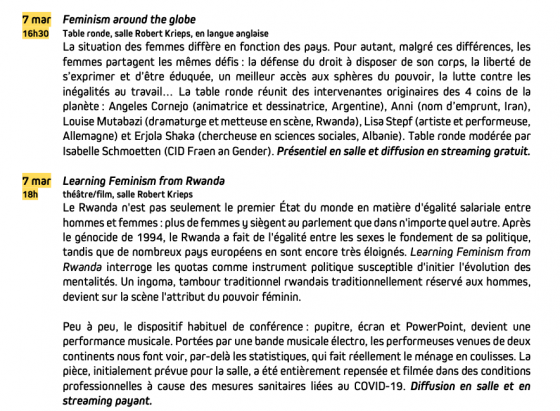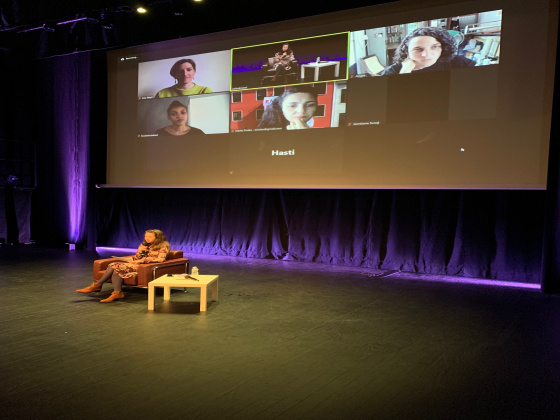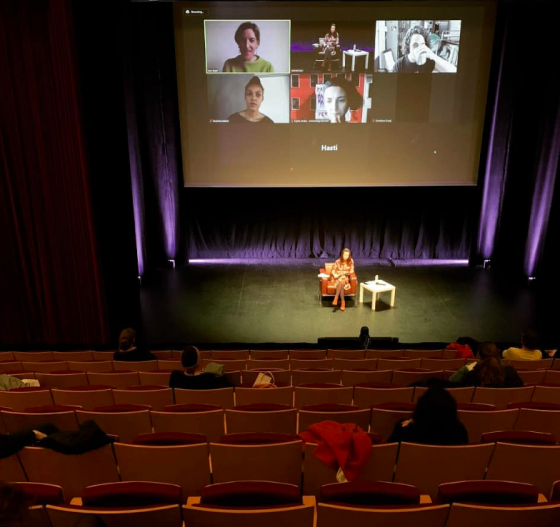Feminism around the world
neimënster haat mech gefrot fir de 7. Mäerz 2021 eng Table Ronde zum Sujet „feminism around the world“ ze moderéieren. Ech duerft mat 5 Fraen vu verschiddene Kontinenter a mat verschiddene feministeschen Iwwerzeegungen diskutéieren. Et war fir mech eng immens beräicherend an inspiréierend Erfarung. E grousse Merci dem Karine Bouton an dem Ainhoa Achutegui fir dës Chance.

Dat hei war meng Intro virun der Table Ronde:
Good afternoon. My name is Isabelle Schmoetten. I am working at the Information and Documentation Centre on Women and Gender here in Luxembourg. I have the pleasure to moderate this round-table one day before international women’s rights day, one day before the second national women*s strikes in Luxembourg. This event is the perfect ocasion to reflect again on why women are fighting for their rights and for gender equality around the globe.
In Luxembourg as in many western countries, we often think that feminism is a western invention of the 19th century. And even if we still haven’t reached gender equality, we think that it must be far worse in the Global South. When I to talk to people in Luxembourg about the necessity of the feminist movement in our country, I quite often hear the sentence: „but we don’t have problems with women’s rights here. Have a look at Africa, there they have problems with such things.“
From postcolonial theory we’ve learnet that this is a supremacist and racist concept which is not true at all.
First we have to acknowledge that many african nations didn’t have the notion of inferiority of women, before colonization. So one could say the North brought gender equality to the South.
Second we must acknowledge that today in the postcolonial era, some countries from the global south have outdated countries from the global north when it comes to gender equality.
That is why I am very happy to be here today with five women from 4 different continents. I am keen on learning from your feminisms and to hopefully break some stereotypes and prejudices.

Presentation of the speakers
Angie Cornejo is an animator and cartoonist. She was born in Salta, a small and conservative town in the north of Argentina. Since 2009 she has been working on animation projects for kids and on independent animation and comic projects. She is also interested in serial graphic arts, such as screenprinting and stencil, and its application in political activism defending LGBTQI, women and migrant rights. She currently lives in Buenos Aires. Bienvenido Angie.
Farnoush Gholamzadeh is a doctoral student in Germany. She grew up in Iran and now she analyzes women images in the Persian painting from a religious and feminist perspective and observes the influence of womens’ depictions on the society and culture of Iran. She always had an artistic soul and wanted to become a musician but faced much discrimination mostly because of her gender. Through her work she found a way to art in an academic and more theoretical way. Welcome Farnoush.
Louise Mutabazi was born in France and studied theatre and creative writing in Lyon and Paris. She is now living in Kigali-Ruanda since 2018 where she works as an author and producer. She is also the producer of the performance play „Learning feminism from Ruanda“ which we will be seeing tonight at 6pm. Welcome Louise!
Erjola Shaka is from Albania. She holds a BA in Social Work and MA in Human Rights and Democracy in South East Europe as well as a MA in Gender and Women Studies and did trainings on gender issues and human rights, democracy and good governance. She has been working in civil society for around 20 years with different vulnerable groups; whereby the gender perspective and gender equality have been either the focus or the final achievement of any intervention, project or programme implemented. Welcome Erjola.
